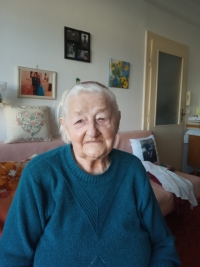She helped Jews move belongings across the fence at night
Download image
Marie Koutná was born into a modest home in Rataje nad Sázavou on 6 February 1926. Her parents Antonín Brůha (born 1894) and Antonie Brůhová (1896–1947) were workers at a local farm. Marie had brother Josef (born 1922) and sister Julie (1932). The children had to help out with the family’s little farm. Marie often carried water, herded a goat and lit the stove. She remembered with love her primary school and the kind teacher who would share her lunches with poor children. The witness was accustomed to working hard since early age. She earned money to buy rolls by carrying water; later on, she bought new shoes with the money she earned picking forest fruit. As the family had no money to support her studies, her education ended with primary school. WWII was in progress by then. Working as a servant with a local family, she helped local Jews moving their property across a fence in order to hide it. She also witnessed the arrest of a neighbour by the gestapo. During the war, Marie worked in the kitchen of a hostel in Rataje. One day, German soldiers came to the kitchen in order to investigate the theft of butter; the cook eventually confessed. She met her future husband Jaroslav Koutný (1925–2013) while working in the field. While in the military, Jaroslav signed up for mining work in 1947 to earn more money. In the meantime, Marie lived and worked in Choceň and the couple married in 1949. They adopted son Petr (born in 1952) from a children’s shelter. Jaroslav worked at the locomotive shed and Marie worked as a cleaning lady and cook at a preschool, at a mangle shop, and then at the Orličan factory. The witness was living in Choceň in 2022 and her message for the young generation is: “Value your freedom and peace!”
